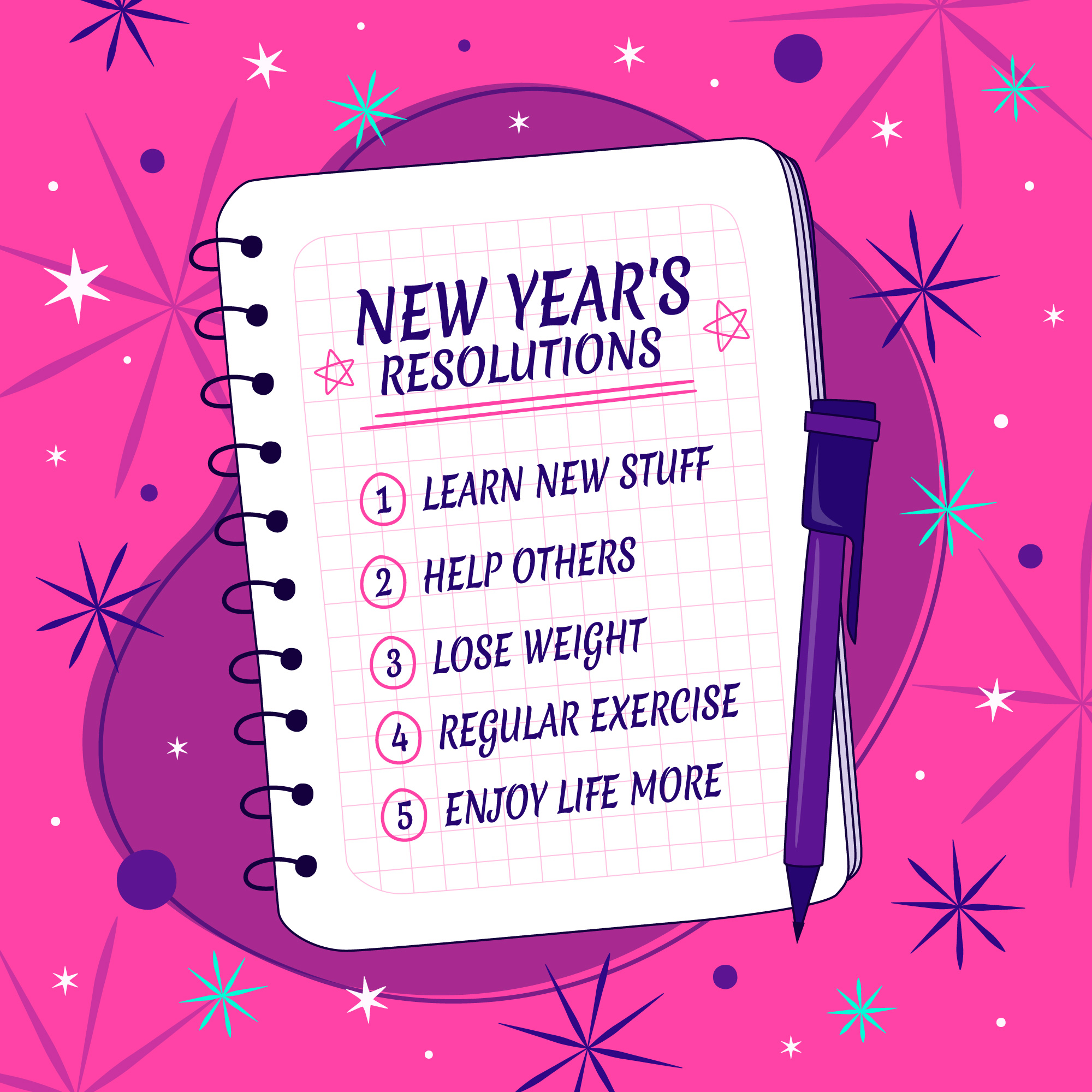The start of a new year is the perfect time to turn a new page, which is probably why so many people make New Year’s resolutions. The new year often feels like a fresh start and a great opportunity to change bad habits and establish new routines that will help you grow psychologically, emotionally, socially, physically, or intellectually.
While many people feel that they don’t achieve their resolution goals, one study showed that those who set New Year’s resolutions are 10 times more likely to actually change their behavior than people who don’t make these yearly goals.
So how long do resolutions last? While most surveys suggest that the majority of people don’t stick with their New Year’s resolutions for long, one 2020 study found that 55% of participants considered themselves successful at sustaining resolutions after a year. Even if resolutions don’t always stick, that doesn’t mean that resolutions aren’t worth making.
Setting a goal is much easier than keeping it, especially for students teeming with excitement over the holiday season. Considering that it is sometimes hard for students to figure out their goals for the new year and, most importantly, stick with them, giving them a helping hand is essential.
In this article, we share a few tips to help you create motivating New Year’s resolutions for students.
1. Choose a Specific Goal
Every year, millions of adults resolve to “lose weight,” “be more productive,” or “get in shape” during the next year. Instead of selecting such an ambiguous goal, focus on something more concrete on which you can realistically set your sights. In other words, choose a particular, achievable goal.
For example, you might commit to losing 10 pounds, making daily to-do lists, or running a half-marathon. Be sure to make your goal realistic rather than drastic. Choosing a concrete, an achievable goal also gives you the opportunity to plan exactly how you are going to accomplish (and stick to) your goal over the year.
2. Limit Your Resolutions
While you might have a long list of potential New Year’s resolutions, Richard Wiseman, a professor of psychology at Hertfordshire University, suggests that you pick just one and focus your energies on it rather than spreading yourself too thin among a number of different objectives.
Taking on too much all at once can be daunting. It can be challenging because establishing new behavioral patterns takes time and sustained effort. Focusing on one specific goal makes keeping a resolution much more achievable.
Where learning meets joy
with friends and teachers who care
3. Put Time Into Planning
Don’t wait until the last minute to choose your goal. Picking wisely and putting in extensive planning are essential parts of achieving any goal. Experts suggest you brainstorm how you will tackle a major behavior change, including the steps you will take, why you want to do it, and ways to keep yourself on track.
If you start working toward a goal without any type of plan, you may quickly find yourself giving up when faced with any sort of obstacle, setback, or resistance. For example, if your goal is to run three times per week, what will you do if you’ve missed four days in a row, and how will you proceed if you need to take time off for an illness or injury?
By knowing what you want to accomplish and the difficulties you might face, you’ll be better prepared to stick to your resolution and overcome anything that might sidetrack you.
4. Start With Small Steps
Taking on too much too quickly is a common reason why so many New Year’s resolutions fail. Starting an unsustainably restrictive diet, overdoing it at the gym, or radically altering your habit are surefire ways to derail your plans. Instead, focus on taking tiny steps that will ultimately help you reach your larger goal.
While it may seem like a slow start, these small incremental changes make it easier to stick to your new healthy habits and increase the likelihood of long-term success.
5. Avoid Repeating Past Failures
Another strategy for keeping your New Year’s resolution is not to make the same resolution year after year. “If people think they can do it, they probably can, but if they’ve already tried and failed, their self-belief will be low,” Wiseman explained in an interview with The Guardian.
If you do choose to reach for the same goals you’ve tried for in the past, spend some time evaluating your previous results. Which strategies were the most effective? Which were the least effective? What has prevented you from keeping your resolution in past years?
Consider altering your resolution slightly to make it more feasible. By changing your approach, you will be more likely to see real results this year.
Where learning meets joy
with friends and teachers who care
6. Get Support
Yes, you’ve probably heard this advice a million times, but that is because the buddy system actually works. Having a solid support system can help you stay motivated and accountable. Ideally, find a like-minded pal or loved one to join you in your goal.
7. Renew Your Motivation
During the first days of a New Year’s resolution, you will probably feel confident and highly motivated to reach your goal. Because you haven’t really faced any discomfort or temptation associated with changing your behavior, making this change might seem all too easy.
After dealing with the reality of dragging yourself to the gym at 6 a.m. or gritting your teeth through headaches brought on by nicotine withdrawal, your motivation to keep your New Year’s resolution may start to dwindle.
When you face such moments, remind yourself exactly why you are doing this. Think about (or write a list to keep handy) what you have to gain by achieving your goal. Finding sources of inspiration can keep you going when times get tough.
For example: Going to bed early from the previous night and getting better quality sleep will help you feel energetic the next day. Listening to music when exercising, taking rest and having breakfast are good ways to complete this perfect goal.
Parting words…
Year-end holidays are a time of joy and relaxation and when we get to think about what we have accomplished so far and what we can work towards in the future. A well-designed list of New Year’s resolutions can truly set the tone for the year. Use the tips we shared in this article to easily create motivating New Year’s resolutions for your students and help them become the best version of themselves the following year.
Hey, if receiving an acceptance letter from your dream college is one of your goals for the coming year, College Compass can support you!
College Compass by Everest Education offers strategic solutions to help aspiring high school students (Grade 9-12) and gap year students get into the best universities and colleges in the world. Our program is led by experienced admissions counselors/coaches who graduated from top US universities (Harvard, Stanford, MIT, UPenn…) and thoroughly understand the US education system.
We offer a personalized pathway and strategies for you, including school selection, standardized testing, extracurricular activity guidance, essays writing, scholarships applications, etc. No matter which phase you are in, we offer the package that is tailored to your age, preferences and study goals to help you achieve your dreams.























